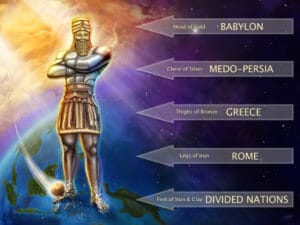Daily Lesson for Monday 28th of April 2025
It was during the Babylonian captivity, through the prophet Daniel, that God presented the most compelling descriptions we have of the relationship between His people and the kingdoms of this world. His people were no longer autonomous; they would now be reaping the consequences of their choices. (And, perhaps, learning from them?)
Read Daniel 2:31-35, which gives a sweeping panoramic view of world history until the end of time. What important truths can we learn from this amazing prophecy?
At the end of the nineteenth century, many people were exuding a new confidence in human progress. The Paris Exposition (1900), for example, was a remarkable showcase of optimism about the future. Surely, with all of our technological and scientific advances, many of humanity’s worst problems would be at an end! As humanity entered the twentieth century, among many thinkers there was this great optimism that Enlightenment ideals—such as human perfectibility and the power of reason—would usher in a wonderful new era for humanity.
World War I, however, quickly shattered those dreams, and by the end of the twentieth century, we had lost more than 200 million people to warfare. We may have advanced in a technological sense, but certainly not in a moral one. To paraphrase Martin Luther King Jr., we have guided missiles but misguided men. And that’s a very scary combination.
Many students of prophecy have noticed that the metals in Daniel 2:1-49 move from most valuable to least valuable: gold devalues to silver, silver devalues to brass, and brass to iron, until we end up with only iron and clay.
Charles Darwin, Karl Marx, and other nineteenth-century thinkers attempted to convince us that humanity is somehow tracking upward—that we are evolving biologically and socially. And though in some ways human existence has improved (at least at a physical level), who actually looks ahead to the future of this world, as it is now ruled and governed, with much optimism about peace, security, and prosperity?
|
Jesus warned, “ ‘And you will hear of wars and rumors of wars. . . . For nation will rise against nation, and kingdom against kingdom. And there will be famines, pestilences, and earthquakes in various places’ ” (Matthew 24:6-7, NKJV). Despite these warnings, how can we draw comfort from knowing that we have been warned beforehand about them? |
 (0)
(0)



